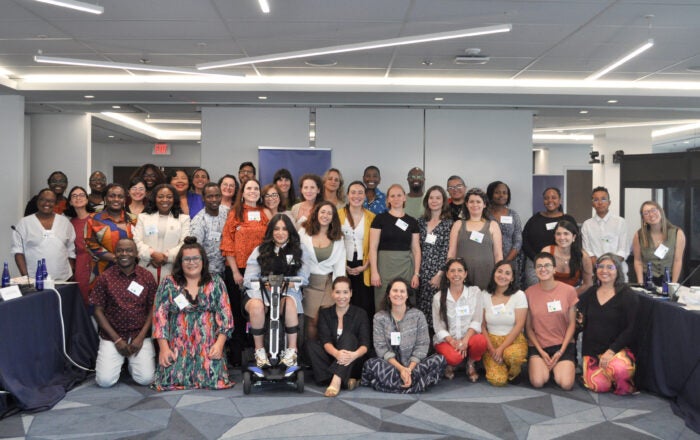Georgetown Law

On August 28-30, 2024, the O’Neill Institute hosted the South-South Dialogue on Respectful Maternity Care & Obstetric Violence at its offices in Washington, D.C. Organized in collaboration with Intersecta, Kerigo Odada, the O’Neill-Lancet Commission on Racism, Structural Discrimination and Global Health, and the Center for Reproductive Rights-Africa, the convening brought together experts representing diverse countries, disciplines, and backgrounds from Africa and Latin America.
It provided participants with a space to not only deepen their understanding of the structural and interpersonal dimensions of obstetric violence, but also reflect on what it means to eliminate obstetric violence while promoting respectful maternity care. In the process, participants shared their experiences, reflected on shared challenges and best practices, and explored opportunities for further transnational dialogue and collaboration.
Participants considered the historical roots of obstetric violence and its intersections with social determinants of health. They reflected on failures to center or even include the voices of people who are disproportionately affected by obstetric violence, such as people with disabilities, are transgender or nonbinary, or are of color, in discussions of both the problem and possible solutions.
Drawing from Dr. Tlaleng Mofokeng’s reflections on the multiple forms of discrimination experienced by many survivors of obstetric violence, participants discussed the importance of intersectionality and inclusion. In the same vein, Professor Michele B. Goodwin explained how colonialism and systemic racism have harmed Black and Latina women in the U.S., perpetuating cycles of criminalization, surveillance, and exclusion from reproductive health care. She stressed that these dynamics have fueled a health care crisis and called for urgent policy reforms—domestically and globally—to address inequalities, protect the most vulnerable, and promote reproductive justice.
Much of the discussions focused on how law and policy can be used to eliminate obstetric violence and advance respectful maternity care. Participants discussed both the benefits and limitations associated with grounding responses in criminal law frameworks. On the one hand, criminalization recognizes the severity of the conduct involved in many cases, can serve as a powerful deterrent for perpetrators, and provides a pathway to justice for individual survivors. On the other, it can shift health providers’ focus from behavior change to legal risk management, serve as an ineffective remedy for survivors in practice, and be applied in a discriminatory manner to less privileged providers, such as midwives and doulas.
Participants referenced alternative approaches for tackling the interpersonal dimensions of obstetric violence, including survivor-centered accountability mechanisms. They stressed that these mechanisms should not only include financial compensation and guarantees of non-repetition, but also center the voices and experiences of survivors and be tailored to address each survivor’s specific needs. In addition, discussions considered various strategies aimed at addressing the structural and institutional drivers of obstetric violence, ranging from strategic litigation to narrative change to broad reforms of health systems, policies, budgets, and curricula, among others.
Throughout the convening, participants underscored the importance of improving communication and collaboration across geographies, sectors, and interventions. Many have since shared what they took away from the convening with their local networks and communities. We hope that these rich discussions continue to support their important work – whether at local, national, regional, or global levels – to eliminate obstetric violence and ensure all people have access to respectful maternity care.
Issues
Related Projects
UN Special Rapporteur on the Right to Health The O’Neill-Lancet Commission on Racism, Structural Discrimination and Global Health Global Innovations for U.S. Reproductive Health Law and Policy
